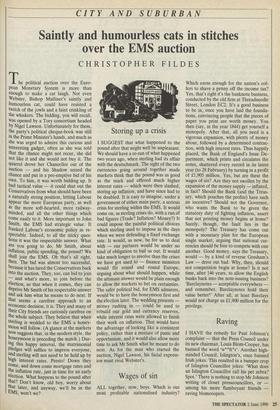Wages of sin
ALL together, now, boys. Which is our most profitable nationalised industry? Which earns enough for the nation's cof- fers to shave a penny off the income tax? Yes, that's right it's the banknote business, conducted by the old firm at Threadneedle Street, London EC2. It's a good business to be in, once you have laid the founda- tions, convincing people that the pieces of paper you print are worth money. You then (say, in the year 1844) get yourself a monopoly. After that, all you need is a vigorous expansion, with plenty of money about, followed by a determined contrac- tion, with high interest rates. Thus happily placed, the Bank of England's Issue De- partment, which prints and circulates the notes, shattered every record in its latest year (to 28 February) by turning in a profit of £1,905 million. Yes, but are these the wages of sin? Are they not swollen by the expansion of the money supply — inflated, in fact? Should the Bank (and the Treas- ury, which pouches the profits) have such an incentive? Should not the Governor, who wants the Bank to be given the statutory duty of fighting inflation, assert that not printing money begins at home? Surely, though, the fault lies in the monopoly? The Treasury has come out with a monetary plan for the European single market, arguing that national cur- rencies should be free to compete with one another. Good money, says the Treasury, would — by a kind of reverse Gresham's Law — drive out bad. Why, then, should not competition begin at home? Is it not time, after 146 years, to allow the English banks back into the note-issuing business? Barclaynotes — acceptable everywhere and remember, Barclaynotes hold their value better!' After all, at least Barclays would not charge us £1,900 million for the privilege.


















































 Previous page
Previous page